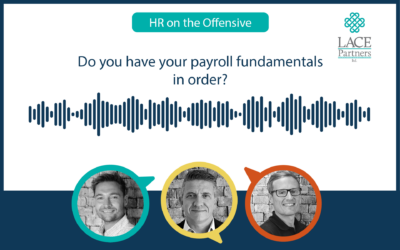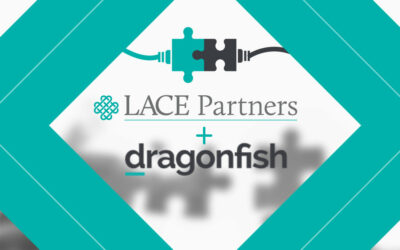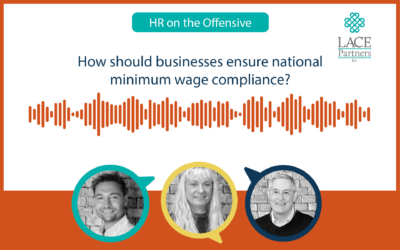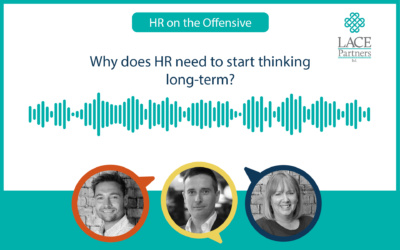This week’s blog is a summary of the some of the discussion topics in the recent HR on the Offensive podcast featuring Charlie Knox, Director of Product & Solutions at SD Worx, who spoke to us about the recent ‘Reinventing HR’ white paper which interviews 3000+ organisations to measure the impact of the pandemic.
If you would like a copy of the white paper you can download it here.
What were the key trends that you saw emerge from your research?
We saw a number of trends that are having a big impact on HR and businesses during this global pandemic period. Firstly, the report showed us how COVID has driven cultural change within businesses. From a HR and payroll perspective that manifested itself as employees having a heightened expectation of what they expect from HR and payroll teams within their own businesses. From the research we conducted we found that there were four main findings from that cultural change impact, which were:
- A need for fluidity, where expectation by employees is set for employers to work in a much less rigid fashion in their working practices.
- A need for flexibility, with employees wanting employers to provide different types of employment which leads to increased engagement from all employees.
- An emphasis on employee experience, including how organisations communicate with workers to deliver the best possible culture for a business.
- The increased role of digitisation, where HR teams were spending a lot of time assessing and reviewing their digital infrastructure.
How has the relationship between employees and employers shifted in the last 12 months?
For me, a key question is how you adapt and engage your workforce to adapt your company culture given that so much has changed. You may have new employees that have never met their peers face-to-face, in some instances they may never have even met your customers face-to-face either. From what we’ve seen with our customers, getting the basics right has been key and payroll has certainly been a key requirement. As the report itself states from one of our contributors, you can invest a large amount of time on developing an amazing company culture, on delivering the best possible employee experience, but if people have trouble getting paid on time, it can do so much damage.
The shift from an emphasis in digitisation in the workplace has shifted too. There is still demand to increase digitisation within businesses, but the focus has shifted to catering for remote working, as well as how increased digitisation can support that flexibility on the packages that employees are offered.
What questions should businesses be asking themselves in how they support their employees?
Businesses should be reflecting on their ability to understand the differing impact of experiences amongst their colleagues. Are they impacted by childcare? Have they themselves been impacted by COVID? Or family members, leading to a change in their circumstances and requirements? There is a level of hyper-personalisation that we have started to see. It can only be achieved with the right systems in place that are intuitive and data-driven, so ensuring you have robust processes to manage the data on your people is vital. It is so important that businesses capture the insights on individuals and record those interactions. What can we derive from these interactions and transactions that employees undertake when using the tools at their disposal? It could be anything from assessing how employees are interacting with FAQs, which FAQs do they access more frequently, etc. This all provides valuable intel and if you can then signpost people in to finding the information they need more quickly, then it ensures that you can create a better experience.
Smooth and efficient processes for payroll is described in the report as ‘the base of the pyramid’ in terms of the hierarchy of HR requirements. Yet the report shows that so many organisations (18%) say they are happy with their current function. Why do you think that is?
This was one of the most surprising elements of the white paper and when we looked in to the 3,000+ companies that we interviewed, only 10% said they had fully integrated HR to payroll processes. This isn’t just small businesses either, as 25% of those surveyed were in the enterprise space, but I think this does come back to the data question. Organisations must ensure that they have access to the right data to be able to make their informed decisions. If an organisation is not completely confident that the data they are feeding in to their system is not fully accurate, then there will be a level of dissatisfaction that we inevitably see from some of the respondents to the research.
I do think the global pandemic had an impact on many HR teams too, because many HR departments went from a semi-regular reporting on people data and KPIs related to people within the business, to needing regular, real-time information about the workforce. Many organisations simply weren’t geared up to deliver on this enhanced level of reporting suddenly required and as a result we have seen some dissatisfaction amongst survey respondents. We’ve seen that in our own business too, as we went from reviewing our people data on a monthly basis, to a daily basis; looking at colleague working, wellbeing, and more.
So many businesses are on a journey towards digital maturity and there will also be questions HR departments will have asked themselves how well equipped they are in terms of accurately interpreting the data they have. If there is a lack of capability – the ability to embrace the inner ‘data geek’ – amongst HR teams, then that too will explain some of the frustrations in terms of where the business is at and how happy it is with its current function.
*********
If you would like to listen to the full podcast you can do so here, or you can subscribe to the podcast via our podcast page here.






